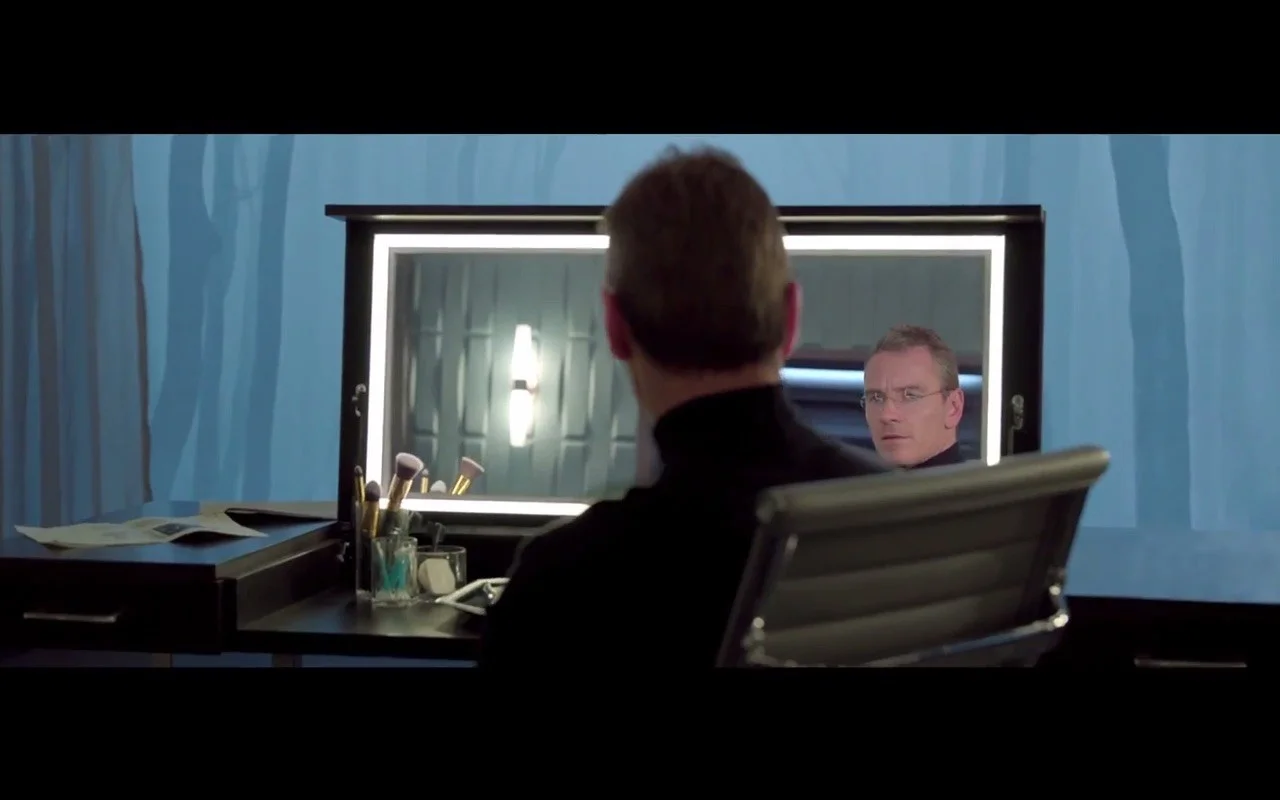Steve Jobs is a very good film about an unlikable asshole. This film is the third to feature the enigmatic co-founder of Apple in two decades. This Sorkin-Boyle production is a well-oiled film about Steve Jobs and his relationship with the people closest to him. However, why Hollywood needed a third film to tell Job's story is beyond me. Aaron Sorkin’s Steve Jobs is a character study of a control freak who doesn’t care what others think about him.
The story is told in three vignettes, the 1984 launch of the Mac, the 1988 Launch of The Next, and the 1998 launch of the iMac. Jobs' story is well known by now so I won’t bother you with the details. Steve Jobs (Michael Fassbender) comes across less as a magnetic genius and more as a con man or used car salesman who often uses underhanded means to get what he wants. Jobs uses fancy words and flowery language to play pied piper to get people to buy his product, excuse me, his vision.
Jobs constantly belittles Steve Wozniack (Seth Rogen), a computer genius and an Apple Co-Founder, who was responsible for the hands on technical work in creating the first Apple products. At one point an exasperated Wozniack asks Jobs, “What do you do?” (pointing out his lack of technical computer skills) and Jobs responds with a metaphor “Musicians play the instruments, but I play the Orchestra.”Furthermore, Jobs refuses to acknowledge the Apple 2 computer team who kept the company afloat for years while Jobs failed to sell the Mac. All Wozniack requests is an acknowledgment—a single sentence from Jobs thanking the Apple 2 team. Yet at three separate product Launches Wozniack's simple request is denied. When Wozniack finally gives Jobs the business near the end of the film, I wanted to cheer, but none of it got through to Jobs. As pointed out by his loyal "work wife", Joanna Hoffman (Kate Winslet), Jobs has a knack for hearing and seeing what he wants in any given situation, so nothing distorts his vision.
The most infuriating part of his character is how much of a complete jerk he is and the insufferable condescension he uses to bombard people. His callous indifference and constant conceit alienate the people around him. Jobs' controlling behavior is exemplified in the way he meticulously devises each product and its launch down to the last meaningless detail or else heads will roll. Sorkin attempts to get to the root of Jobs' controlling personality with an interesting theory: Jobs' adoption, which to him, equates rejection (perhaps the biggest moment in his life and he had no control over it). Thus his main tic, the absence of control, leads to problems (in his mind) particularly in regard to his products, underlings, and others close to him. This is especially evident in the estranged relationship between himself and his daughter, Lisa, and further shown by his cruel treatment of employees and friends.
Still, the movie is very entertaining. The acting is fantastic. Fassbender melts into the role and dominates the screen not relenting on the worst parts of Jobs’ personality or ruthlessness. Kate Winslet portrays Joanna Hoffman, his loyal Polish assistant, and perhaps the only person who can make Jobs listen to reason. She is an essential cog in his world. The other actors also bring their “A” game. Jeff Daniels once again dusts off his finest corporate skills and plays John Sculley the CEO of Apple who famously “fired” Steve Jobs. Particular mention must go to Seth Rogan as Steve Wozniack, the Co-Founder of Apple, portrayed first as the brilliant but soft spoken punching bag for Jobs, who becomes a confident foil for him pointing out his superficiality and his lack of any real technical skills.
Boyle's direction is smooth and taut which allows for the “Walk and Talk” that Sorkin loves to pair with his dialogue. Sorkin’s writing is top notch. The characters bicker and argue with one another giving an authentic feel of real people who revolve around Jobs. Sorkin himself wrote it not as a biography but as a character study of who Steve Jobs was, “a portrait” if you will. The technique works well as the narrative focuses on the launch vignettes, which highlights Sorkin’s love of dialogue. It also allows for an in depth look at what makes Steve Jobs tick, why he needs to control everything, and why he is unable or unwilling to connect with some of the people closest to him.
I find myself asking why this was made when two other Steve Jobs movies already exist. Maybe that’s one of the reasons why this movie didn’t do so well, perhaps we’re at Peak Jobs, or perhaps people are finally recognizing that Jobs embodied qualities that they shouldn’t aspire too. Either way, this is still a very good movie even if you don’t like Steve Jobs, or the cult of Apple. Deftly acted, written with classic sharp Sorkin dialogue, and Boyle’s smooth direction (encapsulating the walk and talk Sorkin loves so much) this film is an engaging look at one of the most successful, powerful, calculating, and controlling egomaniacs in the computer world.
TLDR: Steve Jobs is a good film about an enigmatic and unlikable figure. The movie will appeal more to fans of Sorkin's crackling dialogue and obviously members of the cult of Steve Jobs (4 stars/5)


